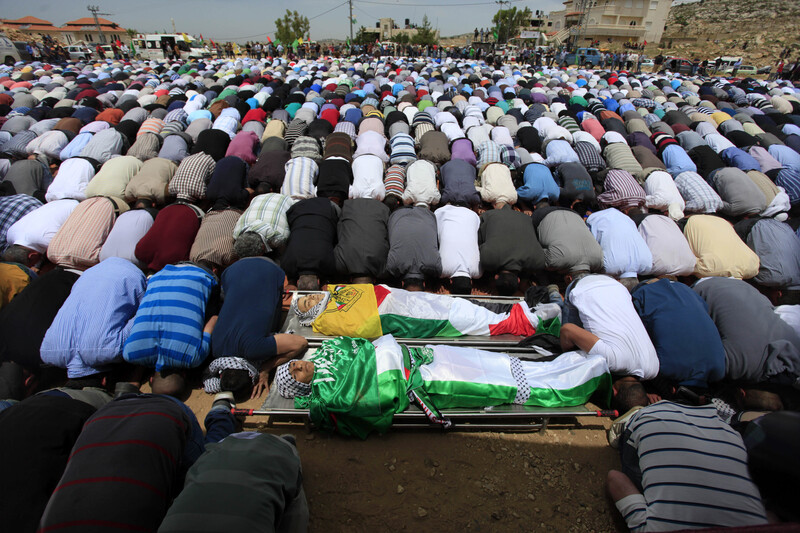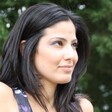Rights and Accountability 19 August 2015

The funderal of Nadim Nuwara (in yellow) and Muhammad Abu al-Thahir on 16 May 2014.
APA imagesThe father of a Palestinian teen shot dead by an Israeli soldier in 2014 met with officials from the US State Department on Thursday, 6 August to demand justice for his son.
The meeting was one of many stops for Siam Nuwara’s month-long tour of the United States to bring attention to the fight for justice for his son, 17-year-old Nadim Nuwara, to anybody who will listen.
Nadim was gunned down on 15 May 2014 by an Israeli border patrol officer in the West Bank village of Beitunia.
Israeli soldiers had surrounded the area to suppress protests near the Ofer military prison, where Palestinians had gathered to commemorate Nakba Day, the anniversary of the ethnic cleansing of Palestine in 1948.
About an hour after Nadim was shot, an Israeli sniper shot dead unarmed 16-year-old Muhammad Abu al-Thahir in the same location.
Both killings were captured on video from several different angles, revealing there were no protests or threats in the vicinity during either boy’s slaying.
Siam Nuwara spoke to The Electronic Intifada just hours after his State Department visit.
He was wearing the same clothes he wore to the meeting, jeans and a black t-shirt adorned with a photo of Nadim beneath the message “Justice for Nadeem.”
“I usually wear a suit, but I wanted to represent my son today,” said Nuwara.
Nuwara expressed optimism about the conversation he had with Oni Blair, director of Near Eastern Affairs at the State Department, and Christopher Russell, a US foreign affairs officer. His story and demand for accountability seemed to resonate, he said, and at the end of the meeting the State Department representatives hugged him, promising to do all they could to hold Israel accountable for Nadim’s murder.
Due to the international attention the videotaped killings garnered, the US has been unusually outspoken about the incident. But harsh words mean very little as the US continues to unconditionally furnish Israel with weapons and diplomatic cover for its crimes against Palestinians.
It’s not as though Nadim’s murder was not an isolated incident. Amnesty International has concluded that the Israeli army uses live ammunition against Palestinians, including children, “as a matter of policy.” So it’s no surprise that those who pull the trigger are shielded from accountability by a discriminatory system of near total impunity for violence targeting Palestinians.
According to the Israeli human rights group Yesh Din, just 1.4 percent of Palestinian complaints filed against Israeli soldiers result in indictments.
One struggle
Nuwara was also scheduled to visit St. Louis to meet with protesters involved in the uprising sparked last year by the murder of unarmed black teenager Michael Brown by white police officer Darren Wilson in Ferguson, Missouri.
During the one-year anniversary of Brown’s murder, Nuwara met with the families of Michael Brown and Vonderrit Myers, a Black teen killed by St. Louis police in October, as well as several activists from Black Lives Matter. He posted video of his time in St. Louis to YouTube, which can be viewed below.
Protests against racist policing practices have spread across the country and continue to grow in the face of ongoing police killings. As of this writing, US police forces have killed 729 people so far in 2015, with people of color disproportionately impacted.
Black Americans in particular are nearly three times as likely as their white counterparts to be killed by the police and are more than twice as likely to be unarmed.
Like Israeli soldiers, US police officers that kill are almost never held accountable.
“Our peoples’ struggle is one in the same,” declared Nuwara. “They [Black Americans] are suffering the way we are suffering. I believe if they can empathize with us and we can empathize with them, it will help both our causes.”
Uphill battle
Despite insurmountable odds, Nuwara has spent every day since Nadim was murdered working tirelessly to secure justice for his son.
Nuwara had to jump through hoops to receive a scintilla of support from the Palestinian Authority, whose officials refused to testify against Israel in Israeli court out of “mutual respect for their Israeli partners,” he says.
Palestinians suspected of participating in even minor acts of resistance to Israel’s colonial violence, like rock throwing, are often arrested and transferred to prisons inside Israel in violation of the Geneva Convention.
“If you want to be like the Israelis, then why don’t you go to Tel Aviv, kidnap the soldier who killed my son and bring him here?” Nuwara recalled asking to PA officials, half in jest.
With the Israeli and Palestinian authorities refusing to properly probe the murder of his son, Nuwara took matters into his own hands. With help from Defense for Children International-Palestine, Nuwara used the evidence he began meticulously gathering after Nadim’s death to disprove each and every one of the lies Israeli government officials advanced in their attempted cover-up of Nadim’s murder.
The cover-up and rampant denials issued by Israeli leaders following Nadim’s murder stand in stark contrast to immediate Israeli condemnations of the terrorist attack by Jewish settlers on the home of the Dawabsha family in the occupied West Bank village of Duma on 31 July.
The arson attack burned 18-month-old Ali Dawabsha alive. His father, 30-year-old Saad Dawabsha, died in the hospital a week later as his mother and 4-year-old brother remain in critical condition with severe burns covering most of their bodies.
Asked why he thinks Israeli leaders condemned the murder of baby Ali but not that of his own child, Nuwara reasoned, “In the case of the small child [Ali Dawabsha], Israel’s reputation is soiled because the attack provoked great shock and solidarity from around the world. The Israelis are doing anything they can to wash their hands of responsibility and make themselves look better.”
High price for justice
In order to pay the exorbitant fees necessary for building a criminal case — everything from legal costs to a body exhumation and second autopsy — Nuwara sold his car and hair salon in the West Bank city of Nablus and Nadim’s older sister lessened her workload at university.
A second autopsy was needed to verify that the bullet, which Nuwara found lodged in Nadim’s backpack, had exited the teen’s body. This was instrumental in proving that it was an Israeli army gun that killed Nadim.
“I thought the hardest thing in the world was to bury your own child,” said Nuwara. “I learned it is even harder to exhume your child who has been murdered. I spent a few nights not sleeping.”
The Nuwara family’s relentlessness and sacrifice paid off. In November, the soldier who killed Nadim, identified by video footage and social media postings as Ben Deri, was indicted on charges of manslaughter and is currently living under house arrest as he awaits trial.
“The criminal suit is about imposing a penalty of incarceration on soldiers that kill children,” explained Siam. “I cannot live while the soldier who murdered my son is free to frolic around the beach in Tel Aviv.”
Still, Nuwara is under no illusions.
“I am now preparing for what happens after the trial,” said Nuwara. He anticipates the soldier will receive a light sentence at best, in which case, “I plan to contact embassies all over the world to say this man is a terrorist and should not be allowed in your country.”
Editor’s note: This article originally stated that Black Americans are four times as likely as their white counterparts to be killed by the police. It has been edited to reflect the correct figure of three times as likely.






Comments
When and where will be be in
Permalink Anonymous replied on
When and where will be be in saint louis?